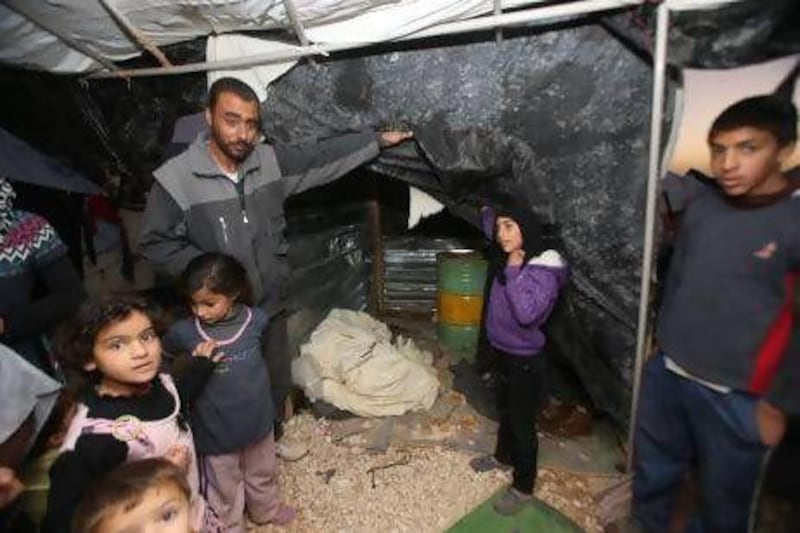"Come see how we are living," Osama Salamat says. "I swear if you come and see this you will see a real catastrophe. People are now wishing to die."
Osama and his wife and nine children are among the 50,000 Syrian refugees at Al Zaatari camp on the Jordanian border.
The camp was lashed last week by three days of rain and a fourth of snow, turning it into a muddy swamp of waist-deep, freezing water. For many, what few possessions they managed to save as they fled their homes in Syria have gone.
Osama saw children almost drowning in the floods. His own were taken to the nearby Moroccan field hospital. "Children are walking bare foot on the snow," he said. "My children."
It has been two weeks since his family were given food. "We used to be given breakfast and dinner. For 15 days now we get nothing," he said.
Protests have broken out over the conditions and many refugees have left, preferring the danger of Syria's civil war to the inhumanity of the camp.
Mr Salamat saw seven buses leave on Sunday. "Thousands went back after the floods," he said. "Death is better than this humiliation."
"We could not sleep," said Ruba, a refugee who cannot remember how long she has been at the camp. "Many people have asked to go back to Syria. Tents are flooded with dirt and water. They wish for death, they say it's better than this."
Andrew Harper, a representative of the United Nations High Commissioner for Refugees, hopes footage of conditions inside the camps will stir potential donors. "Hopefully shocking images will turn into better support," he said.
The UAE has been quick to respond. Since the storms, the President, Sheikh Khalifa, has ordered US$5 million Dh18.4m) of winter assistance to be sent to the refugees in Jordan immediately, on top of the $20m it had already given.
"This is extremely welcome," Mr Harper said. With the UAE's donations, UNHCR will build a second camp with container accommodation rather than tents. The first phase, accommodating 5,000 people, will be ready in a couple of weeks. Once completed, it will house 30,000 people.
Until now, progress in building this much-needed extra accommodation has been slow. Ahmad Al Mazrouie, chair of the UAE Red Crescent, said the UAE had wanted for months to build a new camp in a cemented area in Rabah Al Sarhan to house 10,000 families, but without Jordanian government approval work had yet to start.
"We have all the plans, the money, everything," said Mr Al Mazrouie. "It is meant to be a very high-standard camp, filled with caravans for people, kitchens, a playground with basketball and football nets, clinics and full security. But we have not yet been given the approval."
Had it been approved, the first phase could have been ready in November. "As soon as we get the green light, we will start working," he said.
But that decision, said Mr Harper, rests with the Jordanian government. The UNHCR was "appreciative of the [Jordanian] government and the UAE and the people of the UAE for the contributions they made", he said.
In the meantime, the Red Crescent has been providing food, clothes and blankets, and building the biggest field hospital in the world.
Other possible sites for camps, in Lebanon or Turkey, have been ruled out. "We tried to help in Lebanon, but six months ago when things got worse we stopped," Mr Al Mazrouie said. "We are very committed to help everyone. We cannot go in and work without approvals. Our commitment is completely humanitarian."
In the mud of the camp, Osama waits desperately for aid to reach him. "Who is helping us? It seems that no one cares. I swear to God you will not understand until you see what we are going through."
osalem@thenational.ae






